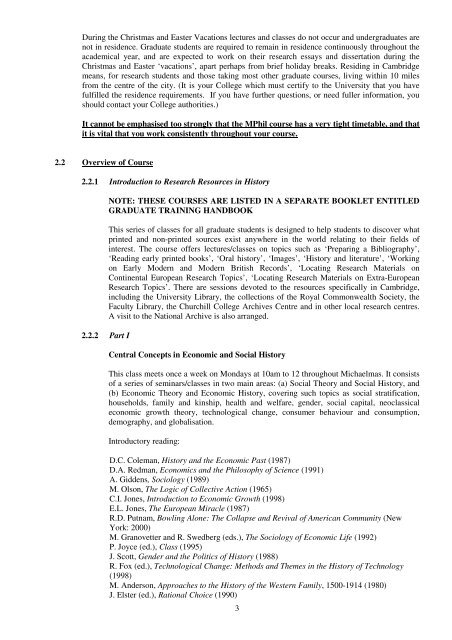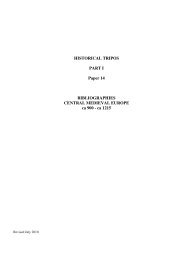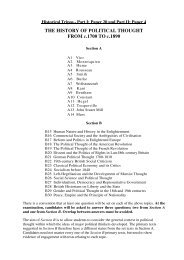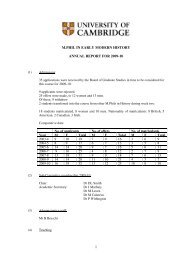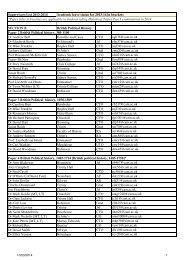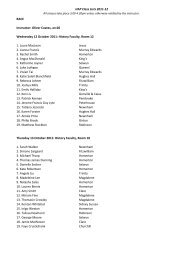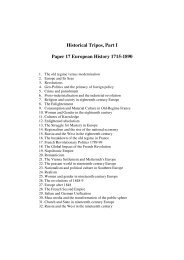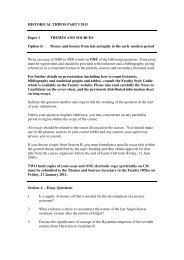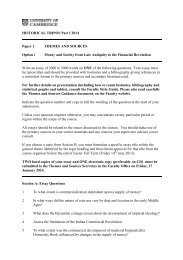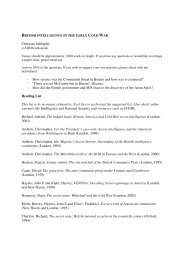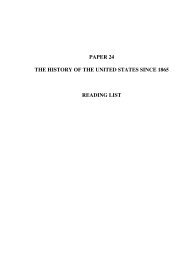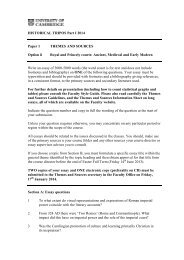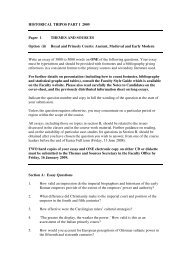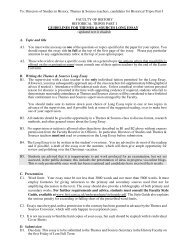Course Handbook - Faculty of History - University of Cambridge
Course Handbook - Faculty of History - University of Cambridge
Course Handbook - Faculty of History - University of Cambridge
You also want an ePaper? Increase the reach of your titles
YUMPU automatically turns print PDFs into web optimized ePapers that Google loves.
During the Christmas and Easter Vacations lectures and classes do not occur and undergraduates are<br />
not in residence. Graduate students are required to remain in residence continuously throughout the<br />
academical year, and are expected to work on their research essays and dissertation during the<br />
Christmas and Easter ‘vacations’, apart perhaps from brief holiday breaks. Residing in <strong>Cambridge</strong><br />
means, for research students and those taking most other graduate courses, living within 10 miles<br />
from the centre <strong>of</strong> the city. (It is your College which must certify to the <strong>University</strong> that you have<br />
fulfilled the residence requirements. If you have further questions, or need fuller information, you<br />
should contact your College authorities.)<br />
It cannot be emphasised too strongly that the MPhil course has a very tight timetable, and that<br />
it is vital that you work consistently throughout your course.<br />
2.2 Overview <strong>of</strong> <strong>Course</strong><br />
2.2.1 Introduction to Research Resources in <strong>History</strong><br />
2.2.2 Part I<br />
NOTE: THESE COURSES ARE LISTED IN A SEPARATE BOOKLET ENTITLED<br />
GRADUATE TRAINING HANDBOOK<br />
This series <strong>of</strong> classes for all graduate students is designed to help students to discover what<br />
printed and non-printed sources exist anywhere in the world relating to their fields <strong>of</strong><br />
interest. The course <strong>of</strong>fers lectures/classes on topics such as ‘Preparing a Bibliography’,<br />
‘Reading early printed books’, ‘Oral history’, ‘Images’, ‘<strong>History</strong> and literature’, ‘Working<br />
on Early Modern and Modern British Records’, ‘Locating Research Materials on<br />
Continental European Research Topics’, ‘Locating Research Materials on Extra-European<br />
Research Topics’. There are sessions devoted to the resources specifically in <strong>Cambridge</strong>,<br />
including the <strong>University</strong> Library, the collections <strong>of</strong> the Royal Commonwealth Society, the<br />
<strong>Faculty</strong> Library, the Churchill College Archives Centre and in other local research centres.<br />
A visit to the National Archive is also arranged.<br />
Central Concepts in Economic and Social <strong>History</strong><br />
This class meets once a week on Mondays at 10am to 12 throughout Michaelmas. It consists<br />
<strong>of</strong> a series <strong>of</strong> seminars/classes in two main areas: (a) Social Theory and Social <strong>History</strong>, and<br />
(b) Economic Theory and Economic <strong>History</strong>, covering such topics as social stratification,<br />
households, family and kinship, health and welfare, gender, social capital, neoclassical<br />
economic growth theory, technological change, consumer behaviour and consumption,<br />
demography, and globalisation.<br />
Introductory reading:<br />
D.C. Coleman, <strong>History</strong> and the Economic Past (1987)<br />
D.A. Redman, Economics and the Philosophy <strong>of</strong> Science (1991)<br />
A. Giddens, Sociology (1989)<br />
M. Olson, The Logic <strong>of</strong> Collective Action (1965)<br />
C.I. Jones, Introduction to Economic Growth (1998)<br />
E.L. Jones, The European Miracle (1987)<br />
R.D. Putnam, Bowling Alone: The Collapse and Revival <strong>of</strong> American Community (New<br />
York: 2000)<br />
M. Granovetter and R. Swedberg (eds.), The Sociology <strong>of</strong> Economic Life (1992)<br />
P. Joyce (ed.), Class (1995)<br />
J. Scott, Gender and the Politics <strong>of</strong> <strong>History</strong> (1988)<br />
R. Fox (ed.), Technological Change: Methods and Themes in the <strong>History</strong> <strong>of</strong> Technology<br />
(1998)<br />
M. Anderson, Approaches to the <strong>History</strong> <strong>of</strong> the Western Family, 1500-1914 (1980)<br />
J. Elster (ed.), Rational Choice (1990)<br />
3


